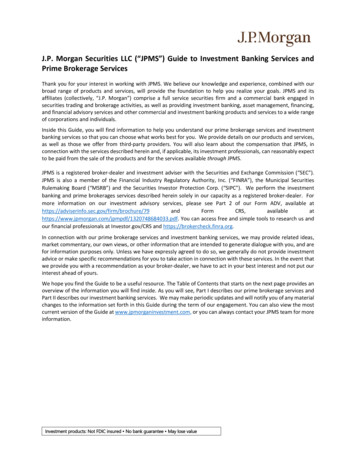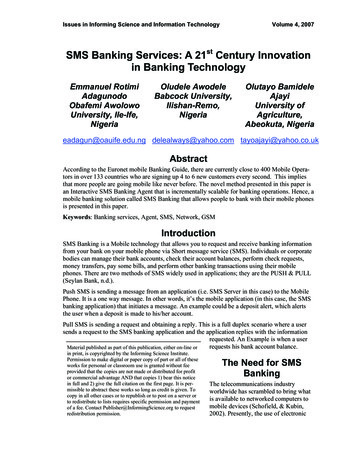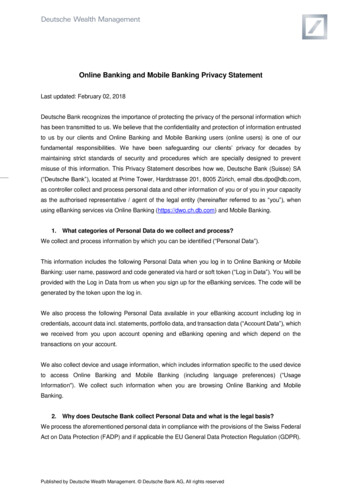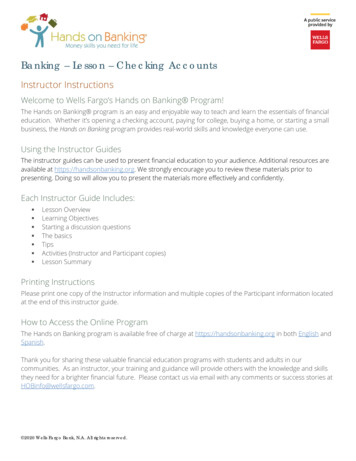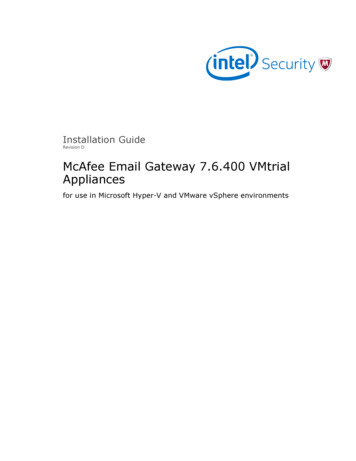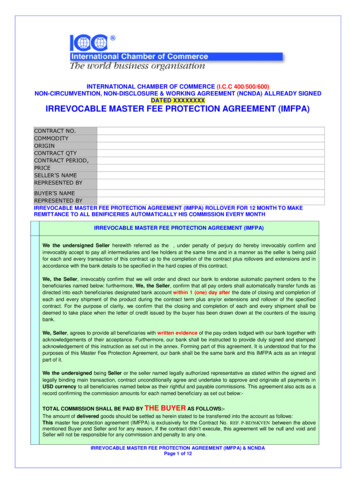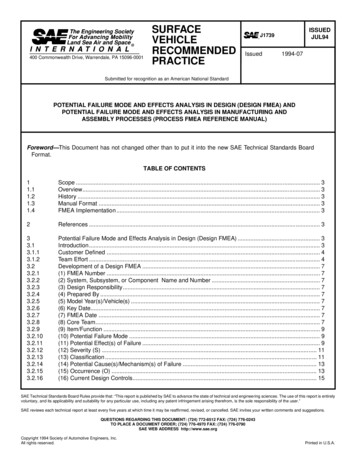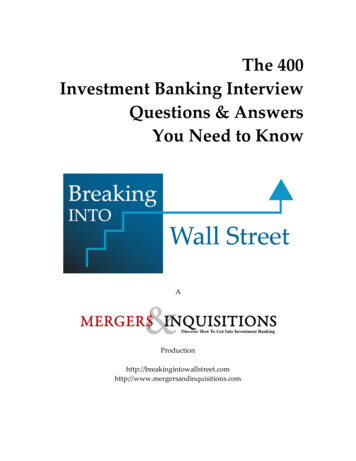
Transcription
The 400Investment Banking InterviewQuestions & AnswersYou Need to tp://www.mergersandinquisitions.com
Copyright 2008 – 2011 Capital Capable Media LLC. All Rights Reserved.Notice of RightsNo part of this book may be reproduced or transmitted in any form or by anymeans, electronic, mechanical, photocopying, recording, or otherwise, withoutthe prior written permission of the www.mergersandinquisitions.com2
Table of Contents – Technical QuestionsIntroduction .3Technical Questions & Answers .5Accounting Questions & Answers – Basic .6Accounting Questions & Answers – Advanced . 19Enterprise / Equity Value Questions & Answers – Basic . 25Enterprise / Equity Value Questions & Answers – Advanced . 30Valuation Questions & Answers – Basic . 32Valuation Questions & Answers – Advanced . 43Discounted Cash Flow Questions & Answers – Basic . 49Discounted Cash Flow Questions & Answers – Advanced. 58Merger Model Questions & Answers – Basic. 61Merger Model Questions & Answers – Advanced . 69LBO Model Questions & Answers – Basic. 78LBO Model Questions & Answers – Advanced . 85Brain Teaser Questions & Answers . 92IntroductionThis guide has one purpose: to help you answer the most important “fit” and technicalquestions in investment banking interviews. We tell you what’s important and what youneed to say – nothing more and nothing less.Most other guides suffer from several problems:1. The information is not investment banking-specific. Do you think you’re goingto get a question about “Why you’re interested in this position?” I’ll tell youwhy you’re interested – because you want to make a lot of money!2. The information is out-of-date, wrong or incomplete (see: The Vault Guide).These days, interviewers assume you know the basics – like how to value acompany – and go beyond that with advanced questions that require thinkingmore than ://www.mergersandinquisitions.com3
3. No answers are provided, or there’s minimal direction (see: The Recruiting Guideto Investment Banking). Of course, you shouldn’t memorize answers word-forword, but it’s helpful to have an idea of how you might structure your answers.4. The questions do not apply to interviewees from diverse backgrounds. If youworked at Goldman Sachs this past summer it’s not hard to convince themyou’re serious about finance – but what if you didn’t? What if you’re making acareer transition or you’re coming in as a more experienced hire? That’s whatthis guide is for.5. The guides were not written by bankers. If you doubt my credentials, just referto Mergers & Inquisitions, where I’ve written over 300 detailed articles onnetworking, resumes, interviews, and recruiting for investment banking andprivate equity. The proof is in the pudding.Your time is limited – so we get you the answers you need, when you need them (rightnow).What follows is a list of 400 investment banking interview questions and answers,divided into different types of “fit” questions (personal, team / leadership, “whybanking,” etc.), technical questions (accounting, valuation, DCF, merger models andLBO models, and brain teasers), and other topics (restructuring, distressed M&A, anddiscussing transactions).This guide is quite length, but you don’t have to read everything. Pick and choosewhich sections are most relevant to you.I recommend reviewing the table of contents first and then skipping to the questions youare most in need of understanding. Or you can read the entire guide all at once as well –it’s up to you.In either case, though, the key is to apply what you’re learning and test yourself. Ratherthan reading everything passively, try to answer each question – and then checkwhether or not you got it right. Do that, and you’ll be several steps closer to landinginvestment banking offers.-BrianMergers & InquisitionsBreaking Into Wall mergersandinquisitions.com4
Technical Questions & AnswersTechnical Questions no longer consist entirely of “How would you value a company?”and “How does Depreciation going up by 10 affect all the statements?”Sure, you may still get these questions – and we do cover them in detail below. Butthese days interviewers are going beyond the basics that everyone knows and askingquestions that make you think instead.There are an infinite number of Technical Questions and it’s impossible to list everythingyou might encounter here – but these are the most common basic and advancedquestions you might get.For Technical Questions there is almost always a “right answer” so we’ll go throughexact answers here as well.If you find yourself not knowing the answer to a Technical Question, you shouldn’t tryto fake it – just admit that you don’t know rather than stumbling through the answer.There are a few exceptions – you really do need to know the basic concepts, like simpleaccounting and valuation. For more advanced modeling, there’s more leeway to saythat you don’t have much experience or don’t know the specific answer.If you want to learn everything behind the questions here in-depth, you should check outthe Financial Modeling Fundamentals Program at a special, members-only discountedrate right here: Financial Modeling Fundamentals – Members-Only DiscountYou must be logged into the site to view that ergersandinquisitions.com5
Accounting Questions & Answers – BasicHere are the 5 most important Accounting concepts you need to know:1. The 3 financial statements and what each one means.2. How the 3 statements link together and how to walk through questions whereone or multiple items change.3. Different methods of accounting – cash-based vs. accrual, and determining whenrevenue and expenses are recognized.4. When to expense something and when to capitalize it. Not all expenses are createdequal.5. What individual items on the statements, like Goodwill, Other Intangibles andShareholders’ Equity, actually mean.The questions below will cover all these concepts.1. Walk me through the 3 financial statements.“The 3 major financial statements are the Income Statement, Balance Sheet and CashFlow Statement.The Income Statement gives the company’s revenue and expenses, and goes down toNet Income, the final line on the statement.The Balance Sheet shows the company’s Assets – its resources – such as Cash, Inventoryand PP&E, as well as its Liabilities – such as Debt and Accounts Payable – andShareholders’ Equity. Assets must equal Liabilities plus Shareholders’ Equity.The Cash Flow Statement begins with Net Income, adjusts for non-cash expenses andworking capital changes, and then lists cash flow from investing and financing activities;at the end, you see the company’s net change in cash.”2. Can you give examples of major line items on each of the financial statements?Income Statement: Revenue; Cost of Goods Sold; SG&A (Selling, General &Administrative Expenses); Operating Income; Pretax Income; Net .mergersandinquisitions.com6
Balance Sheet: Cash; Accounts Receivable; Inventory; Plants, Property & Equipment(PP&E); Accounts Payable; Accrued Expenses; Debt; Shareholders’ Equity.Cash Flow Statement: Net Income; Depreciation & Amortization; Stock-BasedCompensation; Changes in Operating Assets & Liabilities; Cash Flow From Operations;Capital Expenditures; Cash Flow From Investing; Sale/Purchase of Securities; DividendsIssued; Cash Flow From Financing.3. How do the 3 statements link together?“To tie the statements together, Net Income from the Income Statement flows intoShareholders’ Equity on the Balance Sheet, and into the top line of the Cash FlowStatement.Changes to Balance Sheet items appear as working capital changes on the Cash FlowStatement, and investing and financing activities affect Balance Sheet items such asPP&E, Debt and Shareholders’ Equity. The Cash and Shareholders’ Equity items on theBalance Sheet act as “plugs,” with Cash flowing in from the final line on the Cash FlowStatement.”4. If I were stranded on a desert island, only had 1 statement and I wanted to reviewthe overall health of a company – which statement would I use and why?You would use the Cash Flow Statement because it gives a true picture of how muchcash the company is actually generating, independent of all the non-cash expenses youmight have. And that’s the #1 thing you care about when analyzing the overall financialhealth of any business – its cash flow.5. Let’s say I could only look at 2 statements to assess a company’s prospects – which 2would I use and why?You would pick the Income Statement and Balance Sheet, because you can create theCash Flow Statement from both of those (assuming, of course that you have “before”and “after” versions of the Balance Sheet that correspond to the same period the IncomeStatement is tracking).6. Walk me through how Depreciation going up by 10 would affect the /www.mergersandinquisitions.com7
Income Statement: Operating Income would decline by 10 and assuming a 40% tax rate,Net Income would go down by 6.Cash Flow Statement: The Net Income at the top goes down by 6, but the 10Depreciation is a non-cash expense that gets added back, so overall Cash Flow fromOperations goes up by 4. There are no changes elsewhere, so the overall Net Change inCash goes up by 4.Balance Sheet: Plants, Property & Equipment goes down by 10 on the Assets sidebecause of the Depreciation, and Cash is up by 4 from the changes on the Cash FlowStatement.Overall, Assets is down by 6. Since Net Income fell by 6 as well, Shareholders’ Equityon the Liabilities & Shareholders’ Equity side is down by 6 and both sides of theBalance Sheet balance.Note: With this type of question I always recommend going in the order:1. Income Statement2. Cash Flow Statement3. Balance SheetThis is so you can check yourself at the end and make sure the Balance Sheet balances.Remember that an Asset going up decreases your Cash Flow, whereas a Liability goingup increases your Cash Flow.7. If Depreciation is a non-cash expense, why does it affect the cash balance?Although Depreciation is a non-cash expense, it is tax-deductible. Since taxes are a cashexpense, Depreciation affects cash by reducing the amount of taxes you pay.8. Where does Depreciation usually show up on the Income Statement?It could be in a separate line item, or it could be embedded in Cost of Goods Sold orOperating Expenses – every company does it differently. Note that the end result foraccounting questions is the same: Depreciation always reduces Pre-Tax Income.9. What happens when Accrued Compensation goes up by gersandinquisitions.com8
For this question, confirm that the accrued compensation is now being recognized as anexpense (as opposed to just changing non-accrued to accrued compensation).Assuming that’s the case, Operating Expenses on the Income Statement go up by 10,Pre-Tax Income falls by 10, and Net Income falls by 6 (assuming a 40% tax rate).On the Cash Flow Statement, Net Income is down by 6, and Accrued Compensationwill increase Cash Flow by 10, so overall Cash Flow from Operations is up by 4 and theNet Change in Cash at the bottom is up by 4.On the Balance Sheet, Cash is up by 4 as a result, so Assets are up by 4. On theLiabilities & Equity side, Accrued Compensation is a liability so Liabilities are up by 10and Retained Earnings are down by 6 due to the Net Income, so both sides balance.10. What happens when Inventory goes up by 10, assuming you pay for it with cash?No changes to the Income Statement.On the Cash Flow Statement, Inventory is an asset so that decreases your Cash Flow fromOperations – it goes down by 10, as does the Net Change in Cash at the bottom.On the Balance Sheet under Assets, Inventory is up by 10 but Cash is down by 10, sothe changes cancel out and Assets still equals Liabilities & Shareholders’ Equity.11. Why is the Income Statement not affected by changes in Inventory?This is a common interview mistake – incorrectly stating that Working Capital changesshow up on the Income Statement.In the case of Inventory, the expense is only recorded when the goods associated with itare sold – so if it’s just sitting in a warehouse, it does not count as a Cost of Good Sold orOperating Expense until the company manufactures it into a product and sells it.12. Let’s say Apple is buying 100 worth of new iPad factories with debt. How are all3 statements affected at the start of “Year 1,” before anything else happens?At the start of “Year 1,” before anything else has happened, there would be no changeson Apple’s Income Statement mergersandinquisitions.com9
On the Cash Flow Statement, the additional investment in factories would show upunder Cash Flow from Investing as a net reduction in Cash Flow (so Cash Flow is downby 100 so far). And the additional 100 worth of debt raised would show up as anaddition to Cash Flow, canceling out the investment activity. So the cash number staysthe same.On the Balance Sheet, there is now an additional 100 worth of factories in the Plants,Property & Equipment line, so PP&E is up by 100 and Assets is therefore
this guide is for. 5. The guides were not written by bankers. If you doubt my credentials, just refer to Mergers & Inquisitions , where I’ve written over 300 detailed articles on networking, resumes, interviews, and recruiting for investment banking and private equity . The proof is in the pudding.File Size: 675KBPage Count: 94


